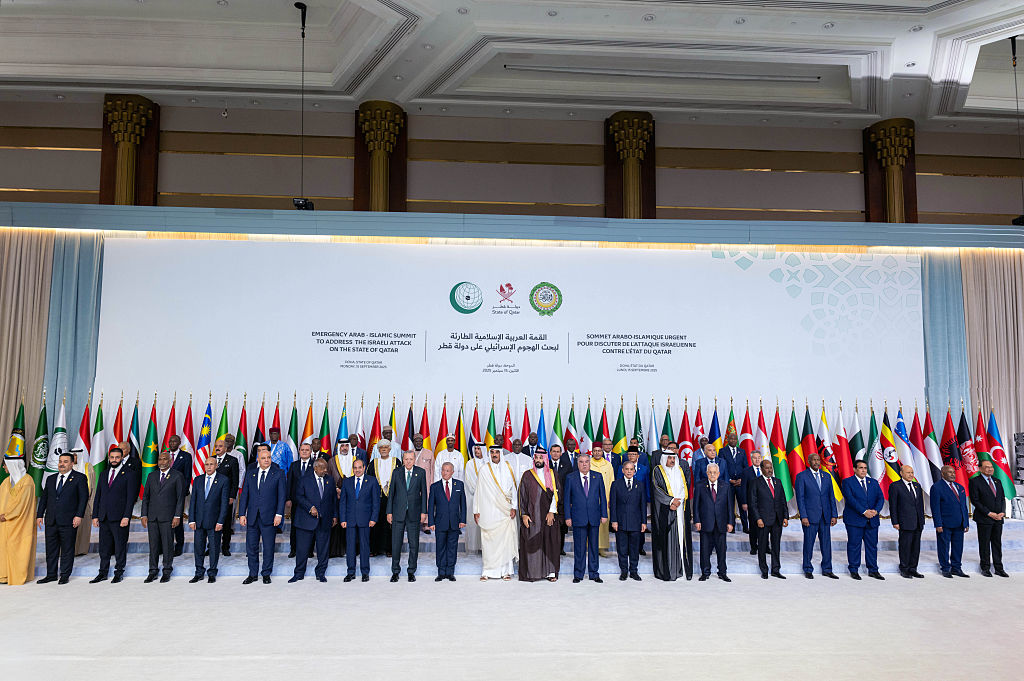At an emergency summit in Doha attended by leaders from over 40 Arab and Islamic nations, Pakistan took center stage in advocating for the creation of a NATO-style military alliance. The meeting, convened after Israel’s strike on Hamas leaders in the Qatari capital, was aimed at delivering a united response to Tel Aviv. While the gathering produced little beyond condemnations and broad pledges, the proposal for an “Arab-Islamic task force” drew notable attention, and raised questions about its wider implications.
Pakistan, the only nuclear-armed Muslim nation, and Turkey, a NATO member with a history of siding with Islamabad against India, were both present. Their participation has sparked speculation in New Delhi about the potential consequences of such a bloc, even though its stated focus is Israel.
Represented by Prime Minister Shehbaz Sharif and Foreign Minister Ishaq Dar, Pakistan co-sponsored the summit and lobbied hard for the proposed alliance. Dar declared that Israel “should not be allowed to get away with attacking Islamic countries and killing people with impunity,” while warning that the world’s 1.8 billion Muslims were “eyeing this summit” for a “clear roadmap.”
Sharif echoed the call for a joint Arab-Islamic force and assured Saudi Crown Prince Mohammed bin Salman of Pakistan’s support at the UN Security Council, where it holds a non-permanent seat until 2026.
Turkey, meanwhile, amplified the anti-Israel sentiment but stopped short of endorsing military action, instead urging economic pressure. President Recep Tayyip Erdogan described Israel’s strikes as a “greedy, bloodthirsty” assault on sovereignty.
Strategic Implications for IndiaFor India, the emergence of an “Arab-Islamic NATO” with Pakistan and Turkey at the table could be a cause for concern. Islamabad has long used multilateral platforms to internationalize the Kashmir issue, and Ankara has consistently backed its position. During the four-day mini-war in May, Turkey supplied Pakistan with military hardware and personnel.
A NATO-style security pact, where an attack on one member is treated as an attack on all, could embolden Pakistan, providing it with another forum to advance anti-India agendas. The presence of two states that have openly challenged India’s stance on Kashmir within such a framework could heighten regional tensions.
India’s close ties with Israel, particularly in defense (over $2 billion in annual arms imports) and energy, could also place it at odds with the bloc’s anti-Israel posture. This is despite New Delhi’s balanced approach to the Palestine-Israel conflict, including its recent UN General Assembly vote in favor of Palestinian statehood.
For now, the proposed alliance appears primarily aimed at countering Israel. Key potential members such as Saudi Arabia, the UAE, and Egypt maintain strong relations with India, and the immediate rhetoric from Doha was directed at Tel Aviv. The operationalization of such a force remains uncertain, with internal disagreements among member states likely to slow progress.
Still, the prospect of a nuclear-capable, Islamic military alliance that includes Pakistan and Turkey is enough to warrant close monitoring in New Delhi. The balance between the bloc’s anti-Israel agenda and its members’ broader geopolitical interests will determine whether it evolves into a significant factor in South Asian security dynamics.
You may also like

Top 10 most complained-about shows this year finally unveiled

Black Rabbit filming locations as Jude Law Netflix crime thriller drops

Madeleine McCann suspect Christian Brueckner 'almost under house arrest' says top cop

Perfume fans are 'obsessed' with 'dreamy' new citrus scent at Cult Beauty

Man Utd 'don't need' £62.5m signing as Ruben Amorim told player can save season







